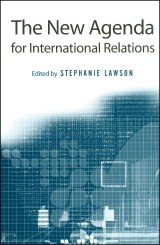Details

The New Agenda for International Relations
From Polarization to Globalization in World Politics?1. Aufl.
|
19,99 € |
|
| Verlag: | Wiley |
| Format: | |
| Veröffentl.: | 06.06.2013 |
| ISBN/EAN: | 9780745677637 |
| Sprache: | englisch |
| Anzahl Seiten: | 256 |
DRM-geschütztes eBook, Sie benötigen z.B. Adobe Digital Editions und eine Adobe ID zum Lesen.
Beschreibungen
There have been significant political eras which have shaped not only the structure of world politics but the way in which it has been studied. The geopolitical and ideological contours of the Cold War period, for example, had an impact on almost every aspect of world politics and the study of international relations for around 45 years.<br /> <p>This book argues that, just as the collapse of the Soviet Union in the period following the fall of the Berlin Wall signalled the end of strategic polarization, it also marked the apparent end of a particular form of polarized debate around political, social and economic ideas. The various new directions taken by scholars of international relations in the post-Cold War era constitute a large part of a ‘new agenda' for the discipline. This collection reflects the variety of issues and approaches that have become part and parcel of this agenda over the past ten years.<br /> </p> <p>Issues tackled in this volume include the power of culture and ideology, the concept of globalisation, inequality, human rights and security as well as reflections on new forms of polarization in the post-Cold War world. Each contributor addresses the nature of changes and continuities in world politics, considers how the discipline of international relations itself has changed and reflects on possible directions for the twenty-first Century.<br /> </p> <p>This book will be of great interest to scholars of international relations, global politics, economics and related disciplines.</p>
List of Contributors. <p>Preface.<b>.</b></p> <p><b>Part I: The New Agenda.</b></p> <p>1. Introduction: A New Agenda for International Relations? (<i>Stephanie Lawson</i>)<i>.</i></p> <p>2. Ageing Agendas and Ambiguous Anomalies: Tensions and Contradictions of an Emergent Epoch (<i>James Rosenau</i>)<i>.</i></p> <p><b>Part II: New Issues.</b></p> <p>3. Transnational Paranoia and International Relations: The Case of the ‘West Versus Islam' (<i>Fred Halliday</i>)<i>.</i></p> <p>4. Globalization and the Discourse of Women's Human Rights: Transgressing Boundaries in a Post Cold War World (<i>Jill Steans</i>)<i>.</i></p> <p>5. Developing Inequality: A Global Fault Line (<i>Caroline Thomas</i>)<i>.</i></p> <p>6. Taming Economics, Emboldening International Relations: The Theory and Practice of International Political Economy in an Era of Globalisation (<i>Richard Higgott</i>)<i>.</i></p> <p>7. The Global Politics of the Environment (<i>Lorraine Elliott</i>)<i>.</i></p> <p>8. Meaning, Method and Practice: Assessing the Changing Security Agenda (<i>Karin Fierke</i>)<i>.</i></p> <p><b>Part III: New Perspectives.</b></p> <p>9. The Normative Framework of Post-Cold War International Relations (<i>Chris Brown</i>)<i>.</i></p> <p>10. Signs of a New Enlightenment? Concepts of Community and Humanity After the Cold War (<i>Richard Devetak</i>)<i>.</i></p> <p>11. Beyond Realism and its Critics: The Decline of Structural Neo-Realism and Opportunities for Constructive Engagement (<i>Jack Donnelly</i>)<i>.</i></p> <p>12. After the Fall: International Theory and the State (<i>Stephanie Lawson</i>)<i>.</i></p> <p>Index.</p>
'This is a compelling set of essays focused on the shift from polarization to globalization that accompanied the end of the Cold War; they provide a fascinating analysis of contemporary world politics both empirically and theoretically. This up-to-date collection of well-written and intellectually provoking papers surveys the main changes in world politics since the fall of the Wall.'<br /> --Steve Smith, Professor of International Politics, University of Wales
<b><br /> </b> <p><b>Stephanie Lawson</b> is Professor of Politics and International Relations at Macquarie University.</p>
There have been significant political eras which have shaped not only the structure of world politics but the way in which it has been studied. The geopolitical and ideological contours of the Cold War period, for example, had an impact on almost every aspect of world politics and the study of international relations for around 45 years.<br /> <p>This book argues that, just as the collapse of the Soviet Union in the period following the fall of the Berlin Wall signalled the end of strategic polarization, it also marked the apparent end of a particular form of polarized debate around political, social and economic ideas. The various new directions taken by scholars of international relations in the post-Cold War era constitute a large part of a ‘new agenda' for the discipline. This collection reflects the variety of issues and approaches that have become part and parcel of this agenda over the past ten years.<br /> </p> <p>Issues tackled in this volume include the power of culture and ideology, the concept of globalisation, inequality, human rights and security as well as reflections on new forms of polarization in the post-Cold War world. Each contributor addresses the nature of changes and continuities in world politics, considers how the discipline of international relations itself has changed and reflects on possible directions for the twenty-first Century.<br /> </p> <p>This book will be of great interest to scholars of international relations, global politics, economics and related disciplines.</p>


















